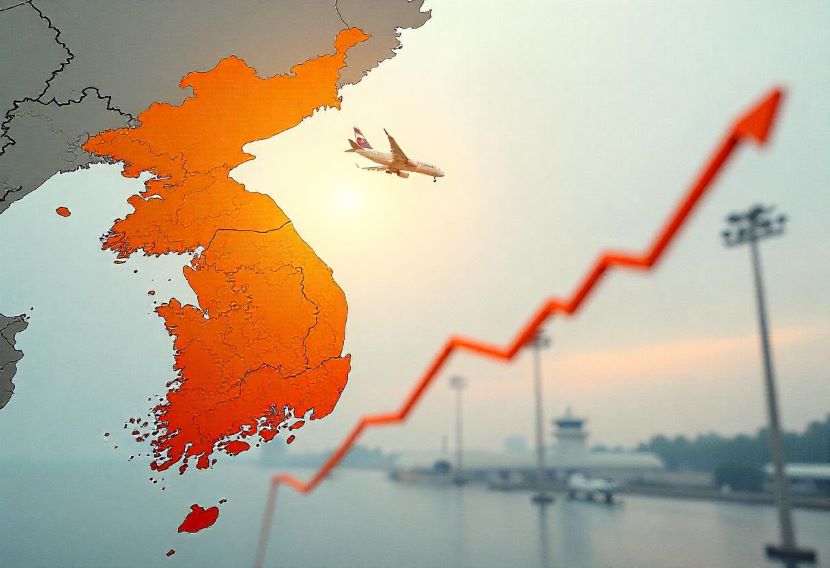Tuesday, July 8, 2025
The travel retail industry in South Korea is set to undergo a significant growth spurt powered by a resurgence in foreign tourism, changing consumer habits, and a rise in luxury expenditure. In 2024, the South Korean travel retail market was valued at USD 1.2 billion and is forecast to reach USD 2.1 billion by 2033, presenting a compound annual growth rate (CAGR) of 5.5% for the forecast years 2025-2033.
This strong growth pattern is mainly fueled by a surge in foreign visitors, rising consumer expenditure, and expanding demand for high-end products. South Korea’s travel retail market is now among the most appealing and vibrant markets in South Korea’s retail scene, and old and new players alike compete for a piece of this increasingly expanding market.
A Booming Travel Retail Market
The surge in international tourism has played a crucial role in this market’s growth. South Korea is not only a popular destination for business and leisure travel but also a hub for regional tourists. According to official data from the Korea Tourism Organization (KTO), the country saw a significant increase in inbound tourists in recent years. With more travelers coming to experience the rich culture and modern conveniences of the country, retail spaces at airports and tourist hotspots have experienced a notable rise in foot traffic. This growing number of travelers is a key contributor to the travel retail boom.
The Rise of Luxury Products and Exclusive Offerings
A notable trend driving the growth of this part of South Korea is the rising demand for premium and luxury products. As tourists visit the country, they often seek high-end cosmetics, electronics, fashion, and gourmet food items, which are often more affordable in travel retail outlets than in regular retail stores. This trend aligns with South Korea’s reputation as a global leader in beauty and skincare, where international travelers frequently purchase world-renowned Korean cosmetics.
In addition to cosmetics, travelers are increasingly attracted to luxury fashion accessories and hard luxury items such as watches and jewelry. The demand for these products is particularly noticeable at key retail hubs, such as Incheon International Airport and major duty-free outlets, where exclusive brand offerings are highly sought after. Retailers are responding to these demands by curating collections of limited-edition products and exclusive items that appeal to the high-end consumer.
Technology and Digital Innovations Enhancing Customer Experience
The integration of digital technologies into the shopping experience has become another important factor driving the growth of South Korea’s travel retail market. With the rise of e-commerce and mobile shopping, retailers in the country’s travel retail space are increasingly adopting innovations such as augmented reality (AR) and personalized product recommendations to enhance customer engagement. These innovations not only attract more shoppers but also increase the amount spent per visit.
Additionally, many small scale outlets in South Korea have adopted digital kiosks and mobile payment systems, which streamline the purchasing process and create a seamless shopping experience for international travelers. These technological advances are helping to elevate the customer experience, making it easier for visitors to explore and make purchases on the go.
Sustainability Trends Shaping the Retail Landscape
As sustainability becomes an increasingly important factor for consumers, this market is evolving to meet these demands. Environmentally conscious travelers are opting for brands that prioritize sustainability, and retailers are responding by reducing plastic packaging, promoting eco-friendly products, and incorporating green initiatives into their operations. Products made from sustainable materials are becoming more common, as consumers show a preference for ethical and environmentally friendly options.
The sustainability trend is not just limited to product offerings; it extends to how retailers manage their operations. Many businesses are implementing practices to reduce their carbon footprint and support sustainability efforts, which resonate well with modern travelers who are more aware of the environmental impact of their purchases.
Market Segmentation and Regional Insights
The South Korea travel retail market can be segmented based on product type, distribution channel, and region. The product types in this market include:
Beauty and Personal CareWines and SpiritsTobaccoEatablesFashion Accessories and Hard LuxuryOthers
Retail distribution channels are predominantly concentrated in key areas, including airports, airlines, ferries, and other travel-related outlets. The most significant retail activities are occurring at major international airports such as Incheon, Gimpo, and Jeju, where large numbers of international tourists pass through every day.
Regional breakdowns indicate that the Seoul Capital Area holds the largest market share due to its high volume of international travelers. Other regions, including Yeongam (Southeastern Region), Honam (Southwestern Region), and Hoseo (Central Region), also show notable growth, driven by the increasing demand for travel retail in major tourist destinations.
The Role of Sustainability in Long-Term Market Growth
Looking ahead, sustainability is expected to play a crucial role in shaping the future of the market. As the global focus on environmental issues intensifies, businesses that prioritize eco-friendly products and practices are expected to gain a competitive edge. This not only aligns with the growing consumer demand for sustainable options but also positions these businesses for long-term success in the evolving market landscape.
Forecast for the Future: 2025-2033
With the expected CAGR of 5.5% from 2025 to 2033, South Korea’s travel retail market is poised for continued growth. As the economy recovers and tourism numbers continue to rise, both international and domestic retail players will have more opportunities to capture the attention of high-spending travelers. The market’s expansion will be further supported by the increasing interest in luxury goods, digital shopping innovations, and sustainability-focused offerings that resonate with modern consumers.
Conclusion
South Korea’s travel retail market is entering a period of significant growth, driven by rising tourism, increasing consumer spending, and a growing appetite for premium products. The rise of digital innovations, along with a focus on sustainability, positions the market for sustained success over the next decade. As global travelers flock to South Korea’s vibrant cities and airports, the demand for exclusive shopping experiences will continue to shape the future of the travel retail industry in the country.
